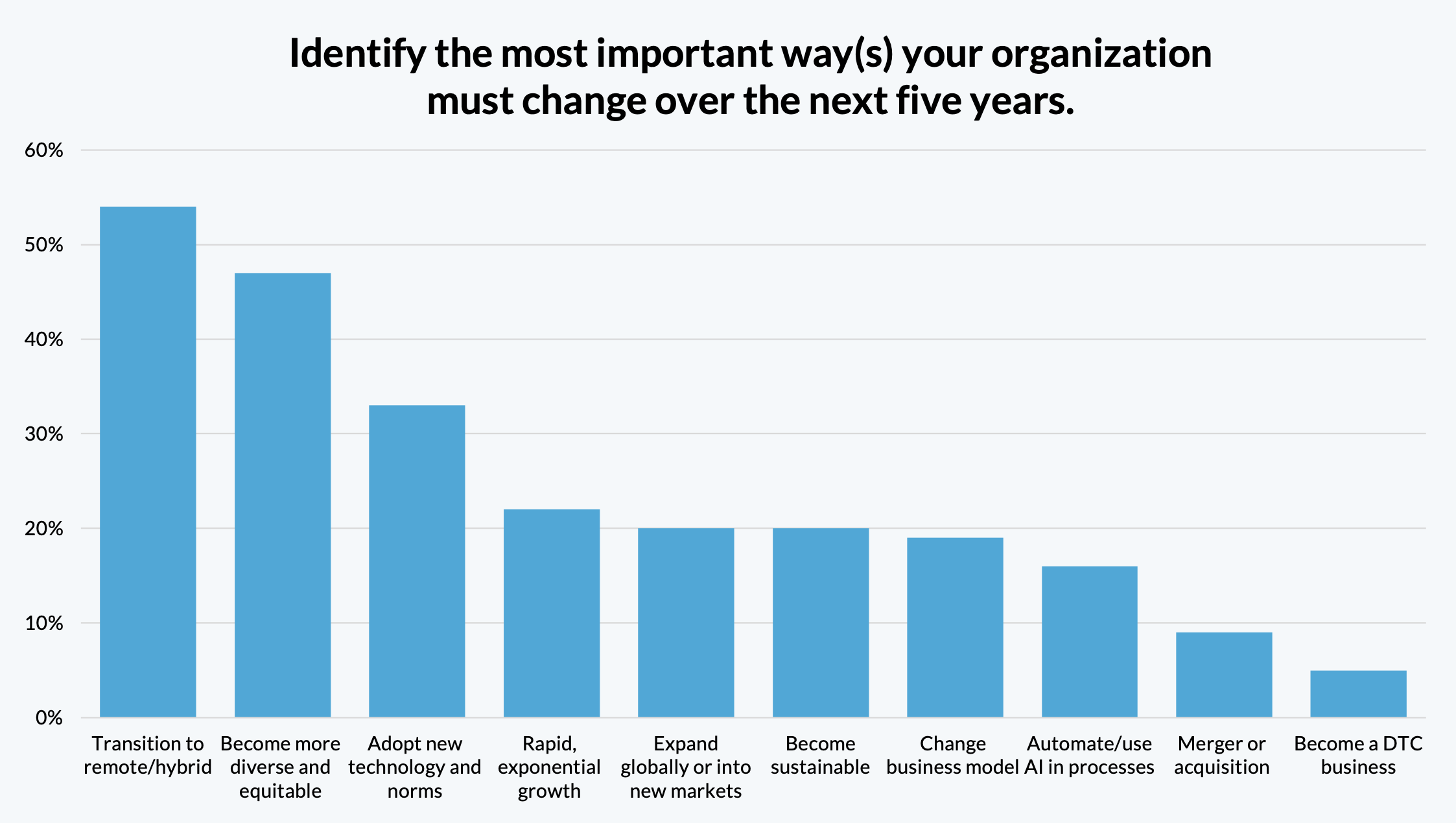How can learning support business transformation?
Jul 26, 2022

Business transformation is in overdrive. Whether it's agile, digital, or cultural transformation, organizations are embracing new ways of working, new technologies, and a new sense of purpose.
Organizations may be tempted to focus on the technological side of these transformations. In the case of hybrid and remote work, for example, businesses can get caught up in questions about which apps they'll use to communicate, how they'll run their virtual meetings, and the ins and outs of tracking who is in the office and when. Though these factors may be important, most organizations find that with the transition to hybrid and remote work (and with any major transformation in the way their teams work together), the biggest challenge is actually the human side of this transition.
What is learning for business transformation?
Well-designed L&D can help support this central challenge of carrying out a successful business transformation. This is because when we're talking about the human challenges that come with any major business transformation, what we're really talking about is the need for mindset and behavioral shift. And learning has a unique role to play in helping this shift happen.
In their new Viewpoint, Learning for Transformation, created in association with Nomadic, Fosway Group explores why it's important for organization to begin thinking about investing in learning to help get their employees ready for the future:
The breadth and depth of change for employees, managers, and customers can be overwhelming, especially as it requires personal change and transformation to flourish. So, what should learning teams be thinking about to help overcome these challenges? How do you support personal transformation and create a culture of learning that can scale and deliver effectively for everyone?
We like the way Fosway poses this question because it links the macro changes––business-wide transformations––to the individual and personal changes that need to take place to support them.
What types of business transformations does learning need to support?
Fosway calls out digital innovation and a new focus on sustainablity as two core drivers of transformation. We have also seen that the shift to hybrid and remote work has played a huge role in spurring employees, particularly those who need to shift to managing hybrid or remote teams, to rethink their day-to-day work at a fundamental level.
In research conducted by Nomadic, we have also seen that a renewed focus on diversity, equity, and inclusion is a key transformation business are undergoing right now, in addition to rapid growth and expansion into new markets, oftentimes globally.
Here's the breakdown of key transformations, based on answers from 126 respondents:

With all these major shifts comes a need for a different approach to work and a different set of skills and capabilities needed to be successful in one's role. But as Fosway points out, it's not just about skill-building. In fact, in order for learning to support these transformations, we must rethink the way we're approaching L&D, and envision this important work much more holistically.
As Fosway explains in their report, "It's all about thinking about the whole person and releasing all their potential," while also consistently tying all learning efforts back to the larger transformation, and telling the story of why this is important both for the individuals involved and the wider business.
What makes learning effective for supporting transformation?
Not all learning is effective in spurring the sort of mindset and behavioral shift that will actually support these key transformations.
Some best practices to keep in mind:
- Many of the capabilities needed for success today are deeply social, so it's worth investing in learning that is, too. Collaborative skills are best acquired through collaborative learning, and we've seen that our cohort-based model, where employees discuss and deepen their learning together, helps learners think about their work, their role, and their team in a new way––exactly what's needed in the midst of a transformation.
- Yet the best learning won't be effective if it doesn't fit into learners' day-to-day work and lives. We've seen that fully synchronous solutions can become complicated for global teams, who may be distributed across time zones. Meanwhile, solo, on-demand learning can be uninspiring, demotivating, and is missing that spark of learning together that makes collaborative learning so effective. To work around this problem, we've created a semi-synchronous approach to learning. Learners are divided into cohorts, who then complete Programs within the same general timeframe (usually 4–6 weeks). They can log on and move through the learning content when it works best for them, but they're also engaging with the material, ideas, and discussion during the same period of time as their fellow cohort members. This offers the flexibility of asynchronous learning alongside the motivation, great learner engagement, and feeling of community most often associated with synchronous learning solutions.
- As Fosway points out in their report, it's not just about the learning itself; it's also about creating a learning culture in which learning is a continuous habit, valued by managers and leadership. In their words: "Central to this is supporting a management culture focused on trust, support, growth mindset, and motivational and developmental feedback."
Why is L&D that supports business transformation so urgent?
Fosway calls out a few statistics that help to show why learning for transformation is so urgent now:
- The digital transformation industry sector is expected to reach $6.8 trillion by 2023
- Experts project the demand for "green skills" will outstrip supply by 2026
- Only 5% of organizations are very effective at matching people and their skills to new opportunities
Meanwhile, Northwestern professer Brian Uzzi has done extensive research showing that while the era of the "star individual" has ended, possessing the skills, capabilities, and mindset that leads to great collaboration in teams is more important than ever. This is particularly important as organizations consider how to support the oft-maligned "middle manager" level, who studies have shown actually drive 22% of revenue––a greater share than any other part of the business.
For this reason, learning that can drive mindset shifts, foster collaborative and team-based skills, and helps prepare people to manage teams while navigating times of change is particularly necessary for any organization looking to transform their business to not just keep up, but ultimately excel in today's complex landscape.
*
Download your full copy of Fosway's Viewpoint, Learning for Transformation, to explore more about how L&D can help organizations rise to the challenges of the moment (and what's coming next).
Interested to discover more about how Nomadic’s cohort-based Academy can support transformation at your organization? Learn about our approach, or get in touch to request a demo.
Sign up to get the latest expert commentary, analysis, and news in learning and leadership delivered straight to your inbox.




